2014新目标八下unit3知识点
【人教新目标】八年级英语下册《Unit 3》短语及语法讲义
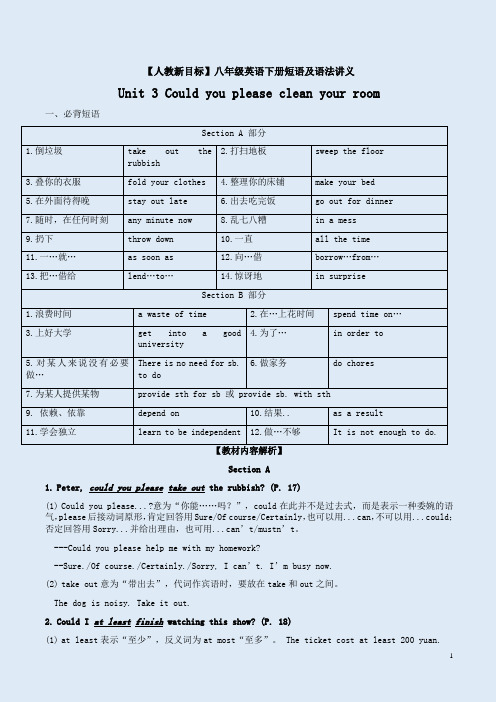
【人教新目标】八年级英语下册短语及语法讲义Unit 3 Could you please clean your room一、必背短语Section A 部分1.倒垃圾take out therubbish2.打扫地板sweep the floor3.叠你的衣服fold your clothes4.整理你的床铺make your bed5.在外面待得晚stay out late6.出去吃完饭go out for dinner7.随时,在任何时刻any minute now8.乱七八糟in a mess9.扔下throw down 10.一直all the time11.一…就…as soon as 12.向…借borrow…from…13.把…借给lend…to…14.惊讶地in surpriseSection B 部分1.浪费时间 a waste of time2.在…上花时间spend time on…3.上好大学get into a gooduniversity4.为了…in order to5.对某人来说没有必要做…There is no need for sb.to do6.做家务do chores7.为某人提供某物provide sth for sb 或 provide sb. with sth9. 依赖、依靠depend on 10.结果.. as a result11.学会独立learn to be independent 12.做…不够It is not enough to do.【教材内容解析】Section A1.Peter, could you please take out the rubbish? (P. 17)(1)Could you please...?意为“你能……吗?”,could在此并不是过去式,而是表示一种委婉的语气,please后接动词原形,肯定回答用Sure/Of course/Certainly,也可以用...can,不可以用...could;否定回答用Sorry...并给出理由,也可用...can’t/mustn’t。
2014春新目标八年级英语下册Unit_3_could_you_please_clean_the_room_Section_A 2a-2d

could 与 can 的用法区别 could 与 can 都是情态动词,二者都可用 于表示请求的句子中,但是用法稍有不同。 can 表示一般性的请求,语气较随便,常 用于熟人之间或长辈对晚辈、上级对下级 的场合。例如: Can you tell us your story, Tony? 请你给我们讲讲你的故事好吗,托尼?
—我不喜欢这件连衣裙。 — I don’t like this dress. —我也不喜欢。 — Neither / Nor do I.
―So+系动词 (助动词或情态动词)+主语” 表示前面所述肯定内容也适用于另一主语。 Practise —玛丽经常帮她妈妈做家务。 — Mary often helps her mother do housework. — 我也是(经常帮妈妈做家务)。 — So do I.
could 表示有礼貌的请求,语气委婉,
常用于非熟人之间或晚辈对长辈、下级 对上级的场合。例如: Could you pass the salt to me? 请你把盐递给我,好吗? Could you please clean your room? 请你打扫一下你的房间,好吗?
She didn’t do any housework and neither did I. neither作副词,意为“也不”, “Neither +系动词 (助动词或情态动词) +主语”表示前面所述否定内容也适用 于另一个人或物。此时也可用nor替换 neither 使用。 Practise
根据汉语意思填空。
1. I have to go to school _________ (尽快) as soon as possible. 2. Sam doesn’t like apples, _______ ( 也不 ) do neither I. 3. He broke his leg and had to lie __________ (一直). the time 4. all The room was in a ______. (杂乱).
新目标人教版英语八年级下册unit3知识点+练习题

新目标人教版英语八年级下册u n i t3知识点+练习题-CAL-FENGHAI.-(YICAI)-Company One1Unit3 Could you please clean your room?Section A(1a-2d)学习目标:1.掌握1a-2d的词语2.学习提出礼貌的请求和请求允许;3.学会使用句型:Could you please...和Could I...;4.学习重点:掌握一些家务活动相关的动词短语。
掌握情态动词could的用法和助动词do的用法。
5.学习难点:掌握情态动词could的用法和助动词do的用法【一】自主学习明确目标1 试读单词,解决语音问题,联系有关旧单词2 查阅下面的短语动词1) 出去吃饭_______________ 2)在外面待到很晚_______________3)去看电影_______________ 4)搭车_______________5)完成做某事_______________ 6)干净整洁_______________ 7)洗餐具_______________ 8)倒垃圾_______________9)叠衣服_______________ 10)扫地_______________ 3.观察以上词组的构成方式:【语言点】1. —Peter, could you please take out the trash请你把垃极倒掉好吗—Sure, Mom.可以,妈妈。
—Could you please do the dishes 请洗盘子好吗—Sorry, I can’t. I have to do my homework.抱歉,我不能。
我得做作业。
(1)在表示请求帮助或请求允许的疑问句中,常用could代替can,以表示礼貌,委婉或不确定的语气,而can则不具备这些语气。
这种情况下不能把could看作can的过去式。
以上两句中用could是为了表示礼貌的请求。
英语人教版新目标八年级下册第三单元Unit-3复习讲义

新目标八年级下册Unit 3 Could you please clean your room?一、词性转换Section A1. sweep → (pt.)swept2. throw → (pt.) threw3. fold→ (pt.) folded Section B1. lend → (pt.) lent2. hate → (pt.) hated3. stress → (v.) stress4. waste → (v.) waste5. provide → (pt.) provided6. depend→ (pt.)depended7. independence →(adj.) independent8. fairness → (adj.) fair9. unfair →(反义词)fair二、短语归纳1. do the dishes 洗餐具2. take out the rubbish倒垃圾3. fold your clothes叠衣服4. sweep the floor 扫地5. make your/the bed 整理床铺6. go out for dinner 出去吃饭7. throw down 扔下8.in surprise 惊讶地9. hang out 闲逛10. hate to do sth. 讨厌做某事11. do chores 做杂务12. enough stress足够的压力13. in order to为了14. provide sth. for sb.向某人提供某物15. get good grades取得好成绩16. mind doing sth. 介意做某事17. depend on依赖;依靠18. look after 照顾,照看19. keep it clean and tidy保持它干净整洁20. get into 进入21. take care of 照顾22. as a result 结果23. do one’ s part in (doing )sth. 做某人分内的事24. get a ride 搭车25.stay out late在外面待到很晚三、句型集萃1. Could you please help out with a few things? 你能帮忙做些事情吗?2.Mom will be back from shopping at any minute now. And she won’t be happy if she sees this mess.妈妈现在随时都会购物回来,如果她看到这些一团糟,会不高兴的。
2014年春新目标八年级下Unit3 Could you please clean your room全单元导学案
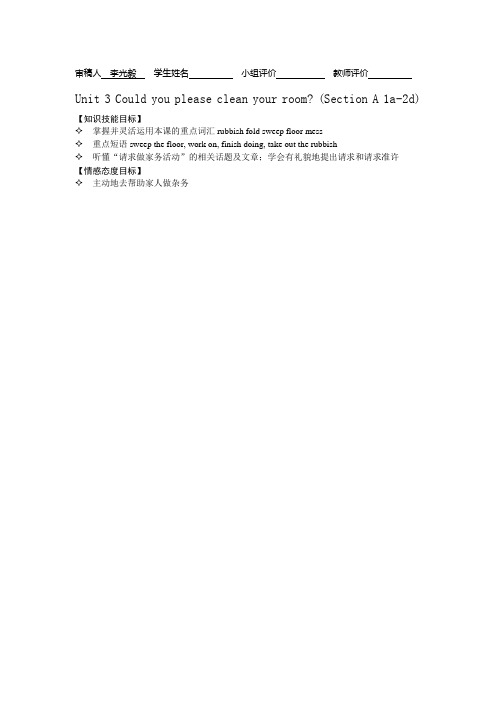
审稿人李光毅学生姓名小组评价教师评价Unit 3 Could you please clean your room? (Section A 1a-2d)【知识技能目标】✧掌握并灵活运用本课的重点词汇rubbish fold sweep floor mess✧重点短语sweep the floor, work on, finish doing, take out the rubbish✧听懂“请求做家务活动”的相关话题及文章;学会有礼貌地提出请求和请求准许【情感态度目标】✧主动地去帮助家人做杂务【自主学习】1.______________洗餐具2._________________ 倒垃圾3.fold the clothes______________4.sweep the floor _____________5.make your/the bed ______________6.___________________打扫客厅7.______________没问题8.______________ 出去吃饭9.stay out late ______________10.go to the movies _____________11.get a ride 搭车12.work on 从事13.______________做完某事14.______________ 干净又整洁【合作探究】1.I think two hours of TV is enough foryou!我认为两个小时的电视对你来说足够了!【观察】主谓一致One and a half hours is enough. 一个半小时足够了。
One of my favorite sports is basketball.我最喜欢的一项运动时篮球【小结】谓语动词与主语要在人称和数上保持一致。
Two months_____ a long holiday.两个月是一个长假。
人教版(新目标)初中英语八年级下册Unit 3 预习自学

Unit 3单词(音标)rubbish [ ˈrʌbɪʃ] n. 垃圾,废物takeout the rubbish 倒垃圾fold[ fəʊld] v. 对折,折叠mess [ mes] n. 混乱,脏乱,食堂throw [ θrəʊ] v. 扔,投掷all the t ime 频繁,反复neither [ ˈni: ðə] pron. adv. 二者都不;也不shirt[ ʃə: t] n. 运动衫,衬衫as soon as 一… 就…,尽快pass [ pɑ: s] v. 前行,经过,批准borrow [ ' bɒrəʊ] v. 借,借用lend [ lend]v. 借给,借出f inger [ ˈ f iŋgə( r)]n. 手指hate [ heɪt]v. 憎恶,讨厌chore [ tʃɔ:( r)] n. 杂务,乏味的工作while [ wail] conj. 当... 时候,而,然而snack [ snæk] n. 小吃,点心,快餐stress [ stres] n. 精神压力,心理负担waste [ weɪst] v. 浪费,消耗in order to 目的是,为了provide [ prə' vaid] v. 提供,供给,供应anyway [ ˈeniwei] adv. 无论如何, 不管怎样,而且depend [ diˈpend] v. 取决于,依靠,依赖depend on 依靠于develop [ dɪˈveləp] v. 发展,壮大,开发,研制independent [ ˌ indiˈpendənt] adj. 独立自主的,不受约束的independence [ ˌ ɪndɪ' pendəns] n. 独立fair [ fɛə] adj. 公平的,公正的unfair [ ˌʌnˈfeə] adj. 不公平的,有偏见的fairness [ ˈ feənɪs] n. 公正性,合理性since [ sɪns] conj. 因为,既然neighbor [ ˈneɪbə] n. 邻居take care of 照顾,处理i l l [ i l ] adj. 生病的,有病的drop [ drɔp] v. 落下,跌落unit 3课本教材ß: Yes, sure. Can you do the diihefił fi: Well, c‹suld you please dv them?1.do the diW LisŁn o>t tlio<bsla ş. foldp<cl»tn>4. awacp the ßoor5. mnkn your bed6. tlean the l lvłng roomÎ*in going to cleazi the Iżving zoora. 8: No problem.A: Could I use your computcr?8- Sorry. I’m going to work on it now.A: Well, could I watch TV IB: Yes, you can, but first you have to clenn your room.UNI7 3Llcten. Feter anku hln father lf he cev dcfour thinga. Wbnt doez hia fatžier aay?Check (R) ycs oz norPeter wants’to... ’.Pet4'r’s fathe'r says ... ' Hb fatftsr's ’raasoris$o out for dinner. , W yes no I have to do some worlr.go to t he movies. yes no You have to clean your room. stay out late.gct a ridmyea no I necd to eat breažcišst.yes no You have a basketball game.6žeteo a Wby does Peter*s £atžzer aay ”tzo”7Qraw Ižcee to the reasons žo the čbezt in 2a.Makn convernntions between Peter and hia father.Sister: Tony, could you please help out with a few things?brother: Could I at least finish watching this show?Sister: No. I think two hours of TV is enough for y ou!&rether Pine. What do you want me to do?Sistet: Could you take out the rubbish, fold the clothes and do the dishes? Brother: So much?Sister: Y es, because Mom will be backfrom shopping any minute now.And she won't be happy if she seesthis mess.8io th+r. But the house is already prettyclean and tidy!SiSter: Yes, well, it's clean, but it's not“mother clean"!• •• • • • • • • • Could you please ‹ lean your room? • • • • • • • • • • • • - • - - - • • • • UNIT 3 Reed the story and anawer the questions.1.Why was Nancy’s mom angry with her?2.Did they sc›lve the problem? How?Last month, our dog welcomed mewhen I camc home from school. Hewanted a walk, but I was too tired.I threw dpwn my bag and went to theliving room. The minute I sat down infront of the TV, my mom came over.‘Could you please take the dog for awalk ” she aslted.“Could I watch one show Jirst?‘ I asked.‘No!“ she replied angrily. ”You watch TV all the time and never help outaround thc h nuse! I can’t work all day and do housework all evening.”Well, I work all day at school, t‹rt›! I‘m just as tired as you rn e! " I shoutedback.My mom did not say anything and walked away. For one week, she did notdo any housework and neither did 1. Finally, I could not find a clean dish or • a clean shirt.The next day, my mom came home from work to find the house clean andtidy.“ \ Vhat happened?” ihe asked in surprise.”I'm so sorry, Mom. I finally understand that u•e need ter share the houseworkpRoad tkc sentences kelow. Uzzderltae tote aeatezzcea fzoza tbe sendtagthat incur the snme thing.1.Neither of us did any housework for a week.2.My morn came over as soon as I sat down in front of the 9’V.3.You’re tired, but I’m tired, too.Dectde wketber tize uadezkaed wox<ts kz the senteocea are is orzs‘3?ien wxtte aootberseoteoce uaiog tbe uoderlizscd wozzt in the otbez1.Could you take the dog for a walk? (noun) —• Z vulked home tram nchool. (verb)›uld I watch one show lirst?3.1 c-.an’t work all d ay.4.You watch TV all the time.S. “What happened?” she asked in surprise.A: Cc›uld you please bring a tent,Liu C hang *B- Sure. And cciuh) y‹ru pt •ase .. .?C: Sorry, 1 can’t. 1 hax•e to ,..UNIT 3Cóuld I go out for dinner wìth my friends? Could we g et something to d rink after the movies .. . . Could you please take the dog for a walk7Could ycu please take out the rubbish?S .u . n ..,.t ..h ..á..t shòu ....l .d . b . e .. O ...K. No…you c an t . Y ou have abasketball.ğäniè tomorrOK, but I want to w atch one șhow fłrsț,Yes, sme.Wxżt« R For regaeets P and the correct respozzce.For perœżeeiozzs. ten znatčb eačk one wźthCould I hang out with my friendsa. Yes, here yøuafier t he m ovie? ix Hmm How much do you n eed?‹ı. Yes, but don’t come back too late.4. Could yoø help rrie do the dishes? e, No, ł can’t. I cut my íìnger and I'm trying5.Còuld ynu And me s ome mm!not m pet if ø'e LPMtnthcbIanksinChecouveraaflon.A: I hate tu churos.B: Wc•lT, I hatc some chores toe, but I tikc other chorc•s. A: Really? Great ! I askț'ou to me with some chores then? B. What do you neećl help with ? A: ynu please my clnthcs For me?'8: I don‘t warit to do that ! It’s boring! n: OK. 2lien you do the dishes for me ?B: Sure, no problem. But we go to the movies after that?A : pure. I’ 11 finish my homevs'urk while you help me wit h the dishes. Theri u•e CalE ßO to the movies.Make a list of thingø your group needa tø do +G•dO lł6îFor a campłzt g tctp. Œhez t dżsctss s who wilt Âo bri ” a tint Liu 'tbeæ and complete ttte cbaxt.1. buy some drinks and snacks I _ 5. go to the store2. borrow somemoney6. use your CD p!ayer 3. clean your room7. take out the rubbish _ 4. invite my friends to a party8. make your bedUke the phraaes 1s la to makn convecontiona.Paient:.CöuJd:'you clean Clilld: Yes, I can.Chlid: Gould 1 invite my friends to a party?Parem: No; you can't have a party. Yephave a test on Monila y.Ltatcn to a converoatioo between Sandy and hier moon. Check (c'•) the things In la that you hear.What are they going.to’do7.!’Sandy s mobi ?and'/ and D”ave• • • • ° ° C ould you please clean your room? • • • • • • • • • • • • • • • • • • ° • • UNIWbet do teeangera elk tbetrpazeats' perzoïgatozt kort Wfznt do pazeots sak tkefr teanagezato do? Wztte persx¢s or ¢scxogcrsaext to eacb pbzase.: C ld yo please take out the rubbish?B: Yes, sure.UNIT 3Dlscusa the questànns with jrour partner.1.¥h'hat do you uftcn do tu liclp your parents at hor rte ?2.Do you think kids should help out with chères at home ?The Sunday 4ail ma gazin e Invited parents to write about whether they thuxk young people should do chores at home. Skim the following letters. Which one agreea arid which one dieagreesiDear SirI do not understand why some parents make tlneir kids help with houxcwt›rk and ch‹rres at home. Kids th days already have enough stress from school. they do not have time to study and do housev•-ork, too. Housework is .a iv.aste of their time. Could we ju.st let them do their job as snidetits ? They 3hould ' spend their time on schoolwork in order to get good SiteThis means Iookiz›g quickly through a piece of writfng to fînd the main idea withoute good idea to read the firstgrades and get into a good university. Also, w'hen they getolder, they will have to do housewnrk so there is' to provide a clean and comfortable environment athome for their children And anyway, I think doingchores is not so difficult. I do not mind doing them.s I‹k r4i*I.•Dear Sir,I think it is important for children to learn how to do chores and help theirparents with housework. h is not enough to just get good grades at schooLChildren these days depend on their parents too much They are always asking, "Could you get this for me?" or"Could you help me with that?” Doing chores helps to develop children’s independence and teachn them how to look after themselves. It also help»them th understand the idea of farms Since they live in one house with their p arents, they should know thnt everyone should do their part in keeping it clean and tidy. Our neighbors’son got into a good college but during his first year, he had no idea how to take care ofhimsélf. As 1 reault, he o4Yen fell ill and his g rades dropped be earlier kids l earn to b e independent, the better it is for their future.Mr. Smith1 . ¥V hich letter do you agree with? Why?J. Vhat Wt2l2 d yUU xay tCf fiht? ptirS£lFl W)3O WCOtethe letter you don“t agree with ?•••••-••••Could you please clean your room? •••••••••••••••••••••UNIT 3 According to Ms. Mil)er and Mr. Smith, what are the pros and corxnabout kids doing chores IProsDoing chores helps †o developchildren‘s independence.Housework is a waste of children'sWz?te axle sezztezzce witJz eactz pbzaee trozzi tfze tetterB.1.a waste of time2.there is no need for ... to3.do not mind4.spend time on5.in order to6, it is not enough to* the carli‹•r ... the betterDiscuss cbe queetJona wttb a partner.Do you thtnk children ahotild do some chores at home? Why or whyChildren should d o c hores Children should riot dobeceusa ... choras because ...Unit3 知识梳理【重点短语】1.go out for dinner 出去吃饭2.stay out late 在外面待到很晚3.go to the movies 去看电影4.get a ride 搭车5.work on 从事6.finish doing sth. 完成做某事7.clean and tidy 干净整洁的8.dothe dishes 洗餐具9.take out the rubbish 倒垃圾10.fold your/the clothes 叠衣服11.sweep the floor 扫地12.makeyour/the bed 整理床铺13.clean the livng room 打扫客厅14.no problem 没问题15.welcomesb. 欢迎某人e home from school/work放学/下班回家17.throw down 扔下18.sit down 坐下e over 过来20.take sb. for a walk 带某人去散步21.all the time 一直;总是22.all day/evening 整曰/夜23.do housework 做家务24.shout back 大声回应25.walk away 走开26.share the housework 分担家务27.a comfortable home 一个舒适的家28.in surprise 惊讶地29.get something to drink 拿点喝的东西30.watch one show 观看一个节目31.hangout 闲逛32.pass sb. sth. 把某物传给某人33.lend sb. sth. 把某物借给某人34.get sth. wet 使某物弄湿35. hate to do sth. 讨厌做某事36.do chores 做杂务37.help sb. (to ) d o /with sth•帮助某人干某事38.bring a tent带顶帐篷来39.buy some snacks买些小吃40.go to the store去商店41.invite sb. to a party邀请某人参加聚会42.make sb. do sth. 使某人做某事43.enough stress足够的压力44.a waste of time浪费时间45.in order to为了46.get good grades取得好成绩47.mind doing sth. 介意做某事48.depend on依赖;依靠49.develop children's independence发展孩子的独立性50.look after/take care of 照顾;照看51.do one's part in (doing ) sth. 做某人分内的事【重点句型】1.C ould you please clean your room? 你能打扫一下你的房间吗?2.I have to do some work. 我必须干些活。
2014人教版新目标英语八年级下Unit3_Could_you_please_clean_your_room_sectionA_1a-2d

√ √ √ √ √ √
What
How often
sometimes once a week
three times a week
every day every day twice a week
Make a report like this:
Hello, I'm ..... In my group, We think Kate is the most hardworking. Kate usually does the dishes. She sweeps the floor once a week. She…
Could you please …? …
Yes, sure. Can you …? …
Stay up late
A: Could I stay out until twelve? B: No, you can’t./ No, please don’t.
go out for dinner
A: Could I go out for dinner with my friends? B: Of course./It’s OK.
A: Could I use your …? B: Sorry. I'm going to … . A: Well, could I …? B: Yes, you can. But … / No, you can't…
Listen to the conversation and answer the questions
What’s the boy’s name? Who’s the man in the picture? How do you know? Where are they when they’re talking? Why do you say so? What does Peter want to do?
2014人教版新目标英语八年级下Unit3_Could_you_please_clean_your_room_sectionA_(2d to3c)

“Could I watch one show first?” I asked. “No!” she replied angrily. “You watch TV all the time and never help out around the house! I can’t work all day and do housework all evening.” “Well, I work all day at school, too! I’m just as tired as you are!” I shouted back.
• 1) What did Nancy want to do? • She wanted to watch one TV show first. • 2) What does Nancy’s mother do during the day? And what does she have to do in the evening? • She has to work all day and she has to do housework all evening. • 3) Which sentence has the same meaning as “You’re tired, but I’m tired too.” • I’m just as tired as you are.
“Could I watch one show first?” I asked. “No!” she
副词,生气地
replied angrily. 一直;总是 帮 忙 “You watch TV all the time and never help out around
the house! I can’t work all day and do housework all 整个晚上 evening.” “Well, I work all day at school, too! I’m just as tired as
新目标英语八年级下Unit3知识点总结(打印版)

新版新目标八年级下unit3Could you please clean your room? 知识点总结(情态动词表有礼貌的请求,征询许可,祈使句的用法)重点短语1.do the dishes=wash the dishes 洗碗碟2.take out the rubbish 把垃圾拿出去3.fold your clothes叠衣服4.sweep the floor清扫地板5.make your / the bed 铺床6.clean the living room打扫起居室7.No problem.没问题8.go out for dinner.出去吃饭9.stay out late = stay up 熬夜10.g et a ride 开车兜风give sb a ride 让某人搭便车11.h elp out with 给予什么帮助12.b e back = come back 回来13.c ome over to sp 顺便拜访某地;drop in on sb顺便拜访某人14.a sk in surprise惊奇地问=be surprised to ask15.n either of 两者中没有一个(作主语谓语常用单数)--both of16.a s soon as 一……就……as soon as possible尽可能快17.g et something to drink/ eat弄些喝的东西18.h ang out with…同……一起闲逛(hang 过去式hung)19.C ould you please do…? (礼貌请求)你可以做……吗?20.C ould I please do…? (征求意见)我可以做……吗?21.c lean the living room打扫起居室22.d o some washing/ shopping/ cleaning洗衣服/ 购物/ 做清洁23.s tay out late/ until nine呆到很晚/ 呆到9点钟=stay up 熬夜24.g ive me a ride to town开车送我到镇上25.n eed to do something需要做……26.d o one’s part in doing sth尽自己的职责做某事play a part in doing sth 参与干某事do one’s best to do sth尽自己最大努力干某事27.h elp out with a few things帮助做些事情28.a t least 至少29.f inish doing something完成做……30.b e/ come back from shopping购物回来31.a ny minute/ second/ moment now随时;立刻,马上32.i nvite sb sp 邀请某人去某地invite sb to do sth =sb be invitedto do sth邀请某人干什么invite(名词)invitationThanks for inviting me.= Thanks for your invitation.33.b e angry with sb对某人生气be angry at st h因某事而生气34.s olve the problem解决问题35.t hrow down my bag扔下我的书包36.t he minute/ as soon as / the moment I sat down我一坐下就37.t ake the dog for a walk= walk dog溜狗38.r eplied angrily生气地回答39.a ll the time一直40.n ever help out around the house从没帮助做家务41.w ork all day工作一整天42.d o housework all evening整晚做家务43.s hout back吼回去44.f ind the house clean and tidy发现房间干净又整洁【find / make / feel + it +形容词+ to do sth】45.s hare the housework分担家务46.a clean and comfortable home一个干净又舒服的家47.n either of us我们两个都不48.p ass me the salt= pass the salt to me把盐递给我49.b orrow sth from sb= borrow sb sth.从某人那里借某物【borrow 的持续性动词为keep –过去分词kept】50.l end sth to sb= lend sb sth把某物借给某人51.h ate to do/doing something讨厌做……52.e nough stress from school来自于学校的足够的压力53.b e / get stressed out有压力;紧张54.a waste of their time时间的浪费55.s pend … on/ doing sth花时间在……上56.i n order (not)to do something为了做(不做)……57.g et into a good university进好大学58.t here is no need for sb to do something对于某人来说没必要做59.d epend on 依靠……(常接whether引导的宾语从句,不用if)60.d evelop children’s independence 养成孩子的独立(习惯)61.a developing country 一个发展中国家62.a developed country 一个发达国家63.t he idea of fairness公平意识64.f all ill(短暂性)生病=be ill (持续性)65.g rades dropped成绩下降66.a s a result结果;as a result of =because of 因为;由于67.i t’s fair/ unfair for children to do something对于孩子来说,做……是公平的/ 不公平的。
新目标八年级英语下册unit3重点短语背诵默写

Unit31.到达arrive in/at get to/reach2.在图书馆前面in front of the library3.在浴室in the bathroom4.在厨房in the kitchen5.在理发店in the barber shop6.在理发in the barber’s chair/cut hair7.睡过头sleep late8.做饭cook/make dinner9.做奶昔make a milk shake10.洗完澡get out of the shower11.去洗澡get into the shower12.沿着街走walk down the street13.报警call the police14.给电台打电话call the TV station15.起飞take off16.一次非同寻常的经历an unusual experience17.恰好在我面前着陆land right in frontof me18.想象它是多么奇怪imagine howstrange it was19.想象做imagine doing20.跟着某人做follow sb to do21.上个星期三早上last Wednesday morning22.你在开玩笑!You are kidding!23.从树上跳下来jump down from the tree24.冲某人大叫shout at sb25.大声叫某人shout to sb26.树上的苹果apples on the tree27.树上的风筝a kite in the tree28.骑自行车去学校ride one’s bike to school/go to school by bike29.照相take photos 30.在火车站at the train station31.逃跑run away from32.再来三个苹果another 3 apples/3 more apples33.考虑做think about doing34.发生在…身上happen to sb35.碰巧做(是)happen to do/be36.到纽约的航班the flight to New York37.从武汉起飞take off from Wuhan38.在医务室be at the doctor’s39.生病住院be ill in hospital40.听说hear of/about41.遗憾的听说I’m sorry to hear that42.收到某人的来信hear from43.听见...正在做hear sb doing44.例如for example45.记得他们正在做什么remember what they were doing46.在1922年8月2日on August 2,192247.最重要的事件之一one of the most important events48.被杀(谋杀)be killed/murdered49.在操场上玩儿have fun in/on the playground50.告诉我们那则消息tell us the news51.一起默默走回家walk home together in silence52.(有安排)发生take place53.被恐怖分子毁坏be destroyed by terrorists54.对…有意义have meaning to55.并非所有的事件not all events56.持续了2分钟last 2 minutes57.三个名族英雄3 national heroes58.在太空in space59.在我生日那天on my birthday60.绕地球飞行fly around the earth61.第一次for the first timeUnit31.到达_________________________2.在图书馆前面________________________3.在浴室______________________4.在厨房_________________5.在理发店_________________6.在理发_________________7.睡过头_________________8.做饭_________________9.做奶昔_________________10.洗完澡_________________11.去洗澡_________________12.沿着街走_________________13.报警_________________14.给电台打电话_________________15.起飞_________________16.一次非同寻常的经历_________________17.恰好在我面前着陆_________________18.想象它是多么奇怪_________________19.想象做_________________20.跟着某人做_________________21.上个星期三早上_____________22.你在开玩笑!_________________23.从树上跳下来________________24.冲某人大叫_________________25.大声叫某人_________________26.树上的苹果_________________27.树上的风筝_________________28.骑自行车去学校__________________________________29.照相_________________30.在火车站_________________31.逃跑_________________32.再来三个苹果_________________33.考虑做_________________34.发生在…身上________________35.碰巧做(是)_________________36.到纽约的航班_______________37.从武汉起飞_________________38.在医务室_________________39.生病住院_________________40.听说_________________41.遗憾的听说_________________42.收到某人的来信_____________43.听见...正在做_______________44.例如_________________45.记得他们正在做什么_________________46.在1922年8月2日_____________47.最重要的事件之一_________________48.被杀(谋杀)_________________49.在操场上玩儿_________________50.告诉我们那则消息_________________51.一起默默走回家_________________52.(有安排)发生_______________53.被恐怖分子毁坏_________________54.对…有意义_________________55.并非所有的事件______________56.持续了2分钟_________________57.三个名族英雄________________58.在太空_________________59.在我生日那天________________60.绕地球飞行_________________61.第一次_________________。
人教版新目标初中英语八年级下册Unit3学霸笔记

Unit3 Could you please clean your room?
【词汇解析】
when_过去/现在_
当…从句
while__进行时__
从句
waste [weɪst] v. 浪费,消耗
a waste of time浪费时间
in order to 目的是,为了
7.in order (not)to do sth. 为了(不)做某事
provide [prə'vaid] v. 提供,供给,供应
1
2
重点句型
1.finish (做完) doing sth mind (介意)
2. learn( how) to do sth 学习(怎样)做某事 learn sth.by oneself 自学某事
3.make(使) sb. do sth. 使某人做某事 Let (让)
4. .be pleased with sb.对某人满意 6.The +比较级,the+比较级 越......,就越.....
7. have time to do sth.有时间干某事
8.lend sb. sth.=lend sth. to sb. 把某物借给某人
9.try (not) to do sth 尽力(不)做某事
10. hate to do sth. =hate doing sth.讨厌做某事 11.do one’ s part in (doing ) sth. 做某人分内的事 12 There is no need for sb. to do sth. 对某人来说没必要干某事
13.take sb. for a walk 带某人去散步 14.Could you please do sth. 你能干某事吗?
3。
2014春新目标八年级英语下册Unit_3_could_you_please_clean_the_room_Section_A 1a-1c

Look and say
Could you please ...?
get up early
sweep the floor
cook for us
Could you please not ...?
look out of the window
play soccer here play the computer games
sweep the floor
Try to remember the pictures in order.
Try to remember the pictures in order.
1 2 3
do the dishes
fold the clothes
clean the living room
Байду номын сангаас
4
5
sweep the floor (Yes, sure.)
Which group can ask and answer more questions with the verb phrases?
Chain drills
• • • •
A: Tom, could you please do the dishes? B: Yes, sure. Ann, Could you…? C: Sorry, I can’t. Jim, … D: …
a dirty room
Could you please clean your room? Yes, sure. I’ll do it right away. 不好意思,我马上做。
Could you please take out the rubbish? Yes, Sure./ Of course. / All right. / OK.
八年级下册人教版英语unit3知识点
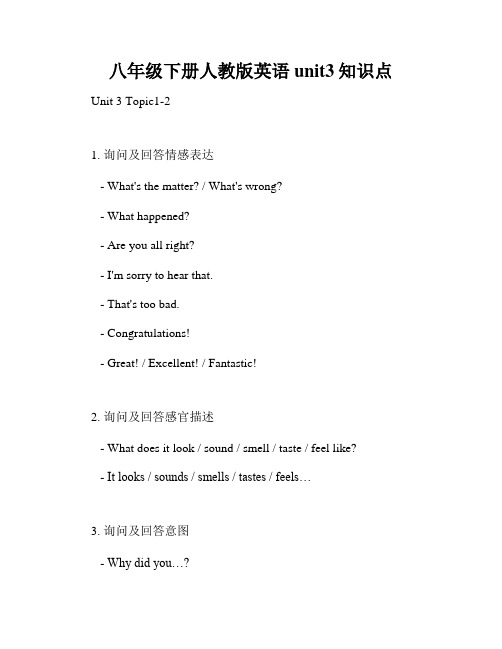
八年级下册人教版英语unit3知识点Unit 3 Topic1-21. 询问及回答情感表达- What's the matter? / What's wrong?- What happened?- Are you all right?- I'm sorry to hear that.- That's too bad.- Congratulations!- Great! / Excellent! / Fantastic!2. 询问及回答感官描述- What does it look / sound / smell / taste / feel like?- It looks / sounds / smells / tastes / feels…3. 询问及回答意图- Why did you…?- What are you going to …?- What do you intend to…?- I intend to… / I plan to…4. 问路及指路,口语表达中熟悉的方向词汇- Excuse me, could you tell me the way to…?- How can I get to…?- The nearest bus stop / subway station / bank / post office is… - It's on the left / right / opposite…Unit 3 Topic 3-41. 表达偏好及兴趣- Would you like…?- What kind of…do you like?- Do you prefer…to…?- I'm into…- I'm fond of…- I enjoy…2. 指出和辨认物品及人物(描述外貌和服装)- What does he / she look like?- He / She has…(描述头发颜色、眼睛、身材特征、穿戴等)3. 询问及描述活动安排- What are you going to do…?- What will you do…?- I'll…4. 描述天气- What's the weather like today?- It's sunny / cloudy / rainy / snowy / windy…- It's hot / warm / cool / cold…Unit 3 Topic 5-61. 表示和理解时间和星期- What time is it?- What's the date today?- What day is it today?- How many days are there in a week?- What do you usually do on weekends?2. 描述行程及活动- Tomorrow, I'm going to…(描述行程)- On Monday / Tuesday / Wednesday…, I usually… - In the morning / afternoon / evening / at night…, I…3. 询问及回答感受- How do you feel?- I feel…(描述感受)4. 描述位置- Where is the…? It's…(描述方位)以上是八年级下册人教版英语unit3的知识点总结,有效巩固这些知识点,可以让你在英语学习中更加得心应手。
2014人教新目标八年级英语下册unit3课件短语

Unit 3 Could you please clean your room?
1.Could you please (not)+ do sth.? 表示委婉地提出请求 ⑴ Could you please clean your room? Yes, I can./Yes, sure./ Of course/ No problem. ⑵Could you please do the dishes? No, I can’t. /Sorry, I have to do my homework. I have a headache. I’m very busy.… 2。Could I do sth. ?委婉的请求许可
⑴ surprising. /surprised adj. be surprised to do sth 做某事而感到惊讶 be surprised + that从句 因...而惊讶 be surprised at 对……感到吃惊
⑵surprise(V.) sb 使某人吃惊 Eg: The bad news surprised me.
11.---Could I use your computer? ---No, you ______. I have to ______ it. A.could, working on B. can, work on C. couldn’t, work on D. can’t, work on 12. ---Could you buy ____ useful books for her? ---Sorry, but I don’t have ____ money A.some, any B. any, any C. some, some D. any, some 13——My room is very clean .——_______. A.So is his B. So his is C. So does his D. So his does 14. ---Peter doesn’t know many people here. ---______. A. So do I B. So am I C. Neither am I D. Neither do I 15. ________ get the early bus, Mr. Green gets up at 6 o’clock every day. A. So that B. In order that C. In order to D. As soon as
人教版新目标英语八年级下册Unit3重点短语和基础习题
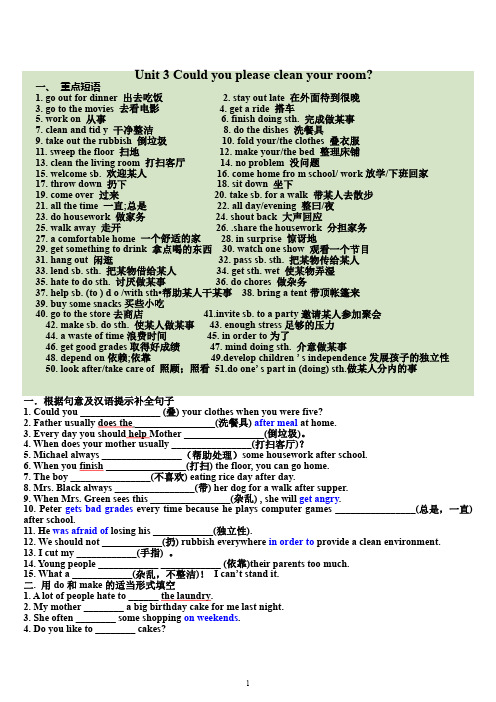
Unit 3 Could you please clean your room?一、重点短语1. go out for dinner 出去吃饭2. stay out late 在外面待到很晚3. go to the movies 去看电影4. get a ride 搭车5. work on 从事6. finish doing sth. 完成做某事7. clean and tid y 干净整洁8. do the dishes 洗餐具9. take out the rubbish 倒垃圾10. fold your/the clothes 叠衣服11. sweep the floor 扫地12. make your/the bed 整理床铺13. clean the living room 打扫客厅14. no problem 没问题15. welcome sb. 欢迎某人16. come home fro m school/ work放学/下班回家17. throw down 扔下18. sit down 坐下19. come over 过来20. take sb. for a walk 带某人去散步21. all the time 一直;总是22. all day/evening 整曰/夜23. do housework 做家务24. shout back 大声回应25. walk away 走开26. .share the housework 分担家务27. a comfortable home 一个舒适的家28. in surprise 惊讶地29. get something to drink 拿点喝的东西30. watch one show 观看一个节目31. hang out 闲逛32. pass sb. sth. 把某物传给某人33. lend sb. sth. 把某物借给某人34. get sth. wet 使某物弄湿35. hate to do sth. 讨厌做某事36. do chores 做杂务37. help sb. (to ) d o /with sth•帮助某人干某事38. bring a tent带顶帐篷来39. buy some snacks买些小吃40. go to the store去商店41.invite sb. to a party邀请某人参加聚会42. make sb. do sth. 使某人做某事43. enough stress足够的压力44. a waste of time浪费时间45. in order to为了46. get good grades取得好成绩47. mind doing sth. 介意做某事48. depend on依赖;依靠49.develop children ’ s independence发展孩子的独立性50. look after/take care of 照顾;照看51.do one’ s part in (doing) sth.做某人分内的事一.根据句意及汉语提示补全句子1. Could you ________________ (叠) your clothes when you were five?2. Father usually does the ________________(洗餐具) after meal at home.3. Every day you should help Mother ________________(倒垃圾)。
新目标人教版初中英语八年级下册Unit3_SectionB_语境法讲解单词
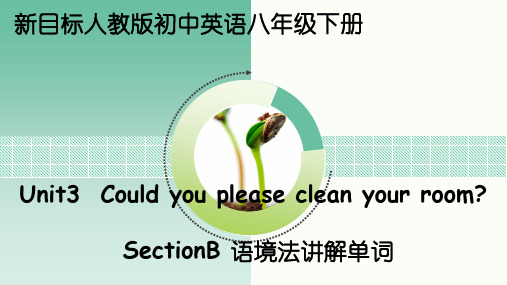
比较 一人一双(pair)很公平(fair)。
unfair [ʌn'feə, ʌn'fer] adj. 不合理的; 不公正的
we take and the things that happen to us.
③Drop everything and come at once!
停止
熟词生义
写
④Drop me a line when you get there.
送
⑤He believes that dropping people in their homes safely is the best reward
词块搭配
(3) __________d_ro_p__b_y_/_in_________顺便走访 (4) _______d_r_o_p__o_u_t_o_f_s_c_h_o_o_l____辍学
练练不忘
( 1 ) My grandmother took out a fifty-yuan note ( 纸 币 ) and _d_r_o_p_p__ed___(drop)it on the ground. (2)(2018本溪改编)—Uncle Wang,I _d_r_o_p_p_e_d__b_y(顺便走访) your home at 6:00 p. m. yesterday, but nobody was in. —Oh, I was having a meeting. (3)Steve had played online games since the age of eleven. He almost __d_r_o_p_p_e_d_o_u_t__fr_o_m__s_c_h_o_o_l__(辍学)last year.
- 1、下载文档前请自行甄别文档内容的完整性,平台不提供额外的编辑、内容补充、找答案等附加服务。
- 2、"仅部分预览"的文档,不可在线预览部分如存在完整性等问题,可反馈申请退款(可完整预览的文档不适用该条件!)。
- 3、如文档侵犯您的权益,请联系客服反馈,我们会尽快为您处理(人工客服工作时间:9:00-18:30)。
【翻译】由于钱不多,我们买不起那栋房子。 Since we haven‟t got much money, we can‟t afford the house.
12】in order to 【辨析】 She got up at 5:00 in order not to be late. She got up at 5:00 in order that she could arrive on time.
In order to 和 in o/cost/take 人做主语: spend: spend time/money on sth spend time/money in doing pay: pay…for 物做主语:cost/take…to do
练习: spent 50 yuan on the skirt. She_______ She_______ paid 50 yuan for the skirt. The skirt _______ cost her 50 yuan. took It _______ him 3 hours to do his homework.
2】problem &question“问题” problem: 客观存在待解决的问题,侧重困难。Solve the problem question: 因存疑而提出问题,侧重疑惑。 answer the question
3】in front of & in the front of 【辨析】 at table 进餐 at the tabel 在桌边 in hospital 住院 in the hospital 在医院(不一定看病)
4】come over 过来 【短语】 come across (偶然)发现 come back 回来 come up with 想出 come true 实现 come from 来自 come on 加油 come in/into 进入,进来 come out 出来,(花)开,(照片)冲洗出来
【辨析】also, too, either, neither 的用法 1] also 较正式,在句中位于行为动词前,系动词、 助动词或情态动词之后。例: Peter also likes beef. I am also a student. She can also swim. 2] too较口语,多用在肯定句句末。
1】 Peter ,could you please take out the trash?
Could you please do sth ? 用于提出请求,希望得到对方肯定回答,语 气较委婉。 肯定回答: Sure./ Of course./ Certainly./No problem. 否定回答: Sorry , I can‟t. / I‟m afraid I can‟t.
5】. she did not do any housework and neither did I. 1] neither 用作副词,意为“也不”,句子须部分倒 装。此时可用nor替换 neither。 — I don‟t like this dress. 我不喜欢这件连衣裙。 — Neither / Nor do I. 我也不喜欢。 【注意】肯定句:He likes beef,.--So do I. 我也喜欢。 2] neither …nor… 既不…也不…, 连接两个词做主语,谓语动词就近原则:Neither Tom nor I am a student 3] neither 作代词表示“两个都不”,它作主语时, 谓语动词常用单数。例如: Neither of my parents is at home.
练习: to have (have) a good ①Students need _______ rest.
mending ②The watch needs_________.(mend)
辨析When/while/as
一、when可以跟延续性动词,也可以跟短暂性动词连 用;while和as只能和延续性动词连用。 (arrive为短暂性) 例:I was out when ________ you arrived.
三、将来时从句常用when(“主将从现”)
I will tell her when she comes here.
as常表示“随着……”;“一边……,一 边……” The students took notes as they listened .
10】辨析borrow /lend/keep 1] borrow ,常与from 连用,“借来” borrow sth from sb. 从某人那里借某物 You can borrow the book from the library. 2] lend,常与to 搭配,“指借出” lend sb sth=lend sth to sb 把某物借给某人 He doesn‟t want to lend his book to others.
5】develop v → development n 发展 →developing adj. 发展的 →developed adj. 发达的 【翻译】 一个发展中国家: a developing country 一个发达国家: a developed country
16】since(连词)既然,由于/自从
还有哪些短暂性动词?
go borrow Join finish
leave come begin
buy die start
二、when主、从句的谓语动词可以先后或同时发生; while和as主、从句的谓语动作必须同时发生。 when They had left _________ I got the airport. _________we were dancing,a stranger came in. (从句动作和主句动作同时发生,且从句动作为延续性 动词时,when,while,as都可使用)
take用法 1]取,拿: Please take some books to the classroom. 2]吃,喝,服用: Take some medicine. 3]乘车,船等: We can take a bus to the park. 4]花费(时间、金钱): It took me 2 hours to do my homework. 【短语】 take care of 照顾 take a walk 散步 take away 拿 take up占据 take place 发生 take off脱下; take one‟s time慢慢来
练习:I can‟t swim, and____________. A neither can she. B she can‟t, too. C so can‟t she. D can she,either.
6】finally/final adj: final exam期末考试 n:World Cup Final世界杯决赛 7】or 否定句“和”。 We don‟t have tea or coffee. 陈述句“或者”。 Answer me yes or no. 疑问句“还是”。 Do you like red or pink? 表转折“否则”。 Hurry up, or you will be late.
新目标八年级下 Unit 3 Could you please clean your room?
尹露
Unit 3 Could you please clean your room?
学习目标: 1 语言目标:谈论做家务的词汇,及如何有礼 貌的提出要求。
2 技能目标:能听懂和谈论做家务的话题;能 写出重点单词和重点句型。 3 情感目标:培养学生爱劳动,分享家务的能 力。
13】辨析 get/ become/ go: 1] get+adj 多与形容词比较级连用。 It‟s getting colder and colder. 2] become 强调变化的结果 . He became a teacher.
3] go+adj.„‟表示令人不快的事情 . go bad变坏 【短语】 get up 起床 get out of从…出 get over 克服 get on well with sb.与…相处得好 get ready for sth.为…做准备 get ready to do sth.准备做某事 get dressed穿衣 get off/on下/上车
9】need v 需要 作实义动词常用于肯定句。 (1)人做主语,sb. need to do sth 某人需要做某事 (2)物做主语,sth need doing = sth need to be done
need做情态动词用于否定句或疑问句. (1)needn’t = don’t have to 没有必要 (2)need ,must 引导的一般疑问句,肯定回答用must, 否定回答用needn’t — Must I go there now? —Yes,you must/No, you needn’t
8】in surprise固定搭配,“惊奇地” He look at me in surprise. 可数名词,“令人惊奇的事或物” That is a big surprise. 不可数名词“惊奇”。 To my surprise, he didn‟t leave. 及物动词,“使惊奇”。 His success surprised us.
14】【辨析】provide &offer &supply
provide为应急等做好准备而“提供; 供给” provide sb. with sth. =provide sth for sb.
offer侧重“主动提供” offer sb. sth. = offer sth to sb.
